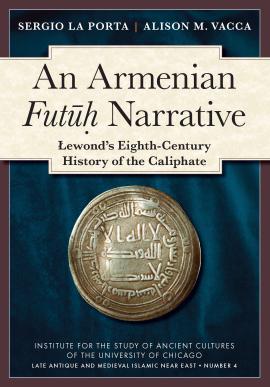ISAC Publications is pleased to announce that a monograph published last year in ISAC’s Late Antique and Medieval Islamic Near East (LAMINE) series, An Armenian Futūḥ Narrative, recently won the Mediterranean Seminar’s 2025 Prize for Best Edition and Translation.The announcement praises the volume as "a model of scholarly rigor and style." The complete announcement can be found on the Mediterranean Seminar website and it has been copied below:
Winner (Best Edition & Translation)
Sergio La Porta and Alison M. Vacca, An Armenian Futūh Narrative: Łewond’s Eighth-Century History of the Caliphate (Chicago: Institute for the Study of Ancient Cultures, 2024).
"Sergio La Porta and Allison Vacca’s edition and translation of this eighth-century Armenian chronicle is a model of scholarly rigor and style. A contemporary witness to the consolidation of the Umayyad and early Abbasid Caliphate, Łewond’s history recounts the dynamics of the Armenian elite, the Islamic expansion, the revolution which transformed the caliphate, and its relations with Byzantium and the peoples and polities of West Asia and beyond, placing these events in the context of a broader Abrahamic West. Beginning with the era of the Rashidun, it recounts the rise and fall of the Umayyad dynasty, through to the “Golden Age” of Abbasid Baghdad under Harun al-Rashid. By casting this Armenian work as a Futūh (“Conquest”) narrative of the Arabo-Islamic tradition, the editors provide a frame for readers to understand the biases and perspectives that shape this account. It invites comparisons to similar chronicles (notable the Mozarab chronicles of the Islamic West) produced by non-Muslim witnesses to the Islamic expansion. With a substantial introduction and commentary, and generous and precise footnotes, Vacca and La Porta make an important source available to scholars and students of Armenian history, Islamic history and the history of the larger Byzantine world. Most importantly, they provide us with a lateral perspective of the events – one which complements and illuminates the parallel histories produced in Byzantium and the caliphates."


